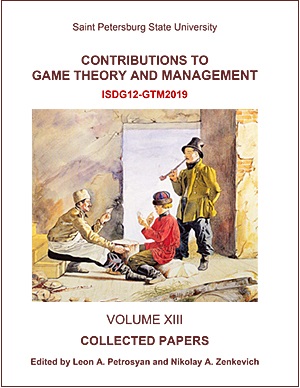Games With Fuzzy Payment Matrix
DOI:
https://doi.org/10.21638/11701/spbu31.2020.06Abstract
We consider a method for solving an antagonistic game with a fuzzy payment matrix based on converting fuzzy estimates of the consequences of possible strategies into an integral estimate in the form of an equivalent fuzzy set with a triangular membership function. The method does not impose restrictions on the type of membership functions for fuzzy elements of the payment.
Keywords:
fuzzy set, fuzzy number, membership function, fuzzy payment matrix
Downloads
References
Downloads
Published
How to Cite
Issue
Section
License
Articles of "Contributions to Game Theory and Management" are open access distributed under the terms of the License Agreement with Saint Petersburg State University, which permits to the authors unrestricted distribution and self-archiving free of charge.




